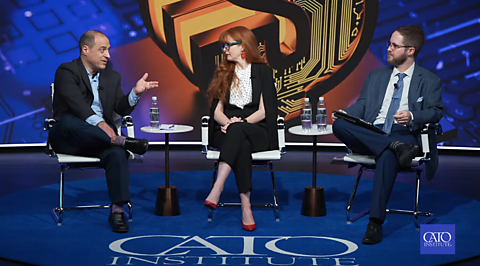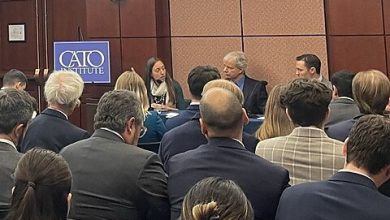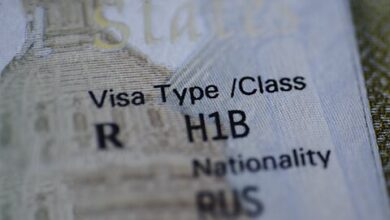Bank Secrecy Act Q&A

With so many great questions at our event marking the 55th anniversary of the Bank Secrecy Act, I thought I’d take a moment to address some of the questions that didn’t get answered on stage.
Note: Some questions have been lightly edited, and similar questions have been combined.
Why don’t more people know that our government gets access to our financial lives and has the power to cancel them?
The biggest challenge may be how hidden this regime is. First, finance is complicated enough. Most people do not enjoy crunching the numbers, checking bank statements, and reviewing their budget. So, it’s already an uphill battle to talk about any issue related to money. Another factor is that certain aspects of this surveillance regime are explicitly confidential. It is against the law for a bank to tell you that they had to file a suspicious activity report. So even if someone goes down the rabbit hole, there are many questions that simply cannot be answered. There’s more to it, but these problems have made it difficult to raise awareness.
Given the severe civil penalties for failing to file reports of foreign bank and financial accounts (FBARs) under Title 31 Section 5321 and the low reporting thresholds that capture millions of ordinary accounts, how are the FBAR compliance burden and penalty regime justified when there is little evidence that the reports provide meaningful value?
The simple answer is that this surveillance regime is not justified. Whether it’s reports on currency transactions, suspicious activity, money abroad, or something else, the evidence suggests this surveillance identifies mostly legal activity. It’s not terrorists or human traffickers who are at the top of the list. It’s people making fairly mundane transactions. All signs suggest the cost greatly outweighs the benefits.
How is the Bank Secrecy Act being expanded to stablecoins?
Stablecoins have been the target of the most recent expansion of the Bank Secrecy Act. This expansion occurred within the Guiding and Establishing National Innovation for US Stablecoins Act (GENIUS Act). The short answer is that the GENIUS Act placed stablecoins on a similar “compliance level” as existing financial institutions. Similar to a bank, “approved stablecoin issuers” are now required to monitor transactions for criminal activity, hand over data to the government, and even freeze such activity. It’s not as bad as if the government were to create a central bank digital currency (CBDC), but it is a step in the wrong direction.
Many statutes in the Bank Secrecy Act defer completely to the Treasury secretary to specify the reporting requirements through regulations. How vulnerable are these regulatory interpretations to a Loper Bright challenge?
This question falls outside my expertise. I defer to the talented lawyers in the Cato Institute’s Center for Constitutional Studies when it comes to assessing the courtroom. However, I will say briefly that there is something important to remember here. Congress gave the Secretary of the Treasury the authority to set many of the rules under the Bank Secrecy Act. Because of that, the Treasury could fix some of the problems we are seeing with the stroke of a pen. Yet, instead, the Treasury has stewarded a consistent expansion of financial surveillance. When Congress moves to reform this system, it should also rethink how much discretionary authority it gives to the Treasury.
In California Bankers Association v. Schultz, the Supreme Court upheld the Bank Secrecy Act. The majority opinion noted that the “high amount” of $10,000 was sufficiently justified at the time (1974), but that further intrusions could affect the right to privacy. Are these thresholds ripe for reconsideration by the courts?
The thresholds are absolutely due for reconsideration. In the 1970s, you could buy two brand-new Corvettes for $10,000. However, 55 years of inflation means that what was once $10,000 now costs around $80,000. In fact, as if that wasn’t bad enough, the origins of this reporting can be traced even further back than the Bank Secrecy Act. Technically, it may be more accurate to say that the threshold should be adjusted to $180,000. Either way, financial surveillance has steadily increased every year because Congress did not index the thresholds for inflation. That needs to change.
As everything becomes digital and payment options become increasingly convenient with cards or online accounts, how do we return to paying with cash? Should we make these online platforms offer us the option to pay in cash on delivery?
The first step to protecting the ability to pay with cash is to actually pay with cash. Businesses respond to incentives. If no one uses cash, they will cancel their armored car service and get rid of the safe in the back room. However, if people continue to use cash, businesses will continue to accept it. That alone would make the biggest difference. Dealing with online platforms is a trickier matter. However, there are a few options on the table. The simplest option is to buy prepaid gift cards with cash. Another option is to order for in-store pickup and pay when you get there. Again, though, the best way to make sure these options stay on the table is to actually use them. Businesses need to see accepting cash as a profitable option.
It’s unfair to say there is no disclosure of what companies do with customer data, as required disclosures are provided, and people are agreeing to those Terms & Conditions. You can’t make people read those disclosures. Is there a more effective way to ensure people understand?
This is a good point, and it really extends to many issues. You can provide someone with all the information in the world, but that doesn’t mean they will use it. While the answer to this question likely requires deeper insights from psychologists, I believe one part of the answer is that there needs to be a greater awareness of the importance of privacy. Significant progress has already been made in this effort. For example, the phrase “If you aren’t paying for the product, you are the product” is now widely recognized and has inspired many people to gain a better understanding of the true cost of things like social media. However, much more awareness is needed.
How can governments work to prevent money laundering while minimizing the damage to privacy and individual freedoms, in your opinion?
This question hits at the heart of the matter. How can a balance be struck between a right to privacy and a legitimate legal investigation? The answer can be found in the Fourth Amendment to the US Constitution. The Fourth Amendment provides the framework for protecting privacy while allowing law enforcement to intervene. It does so by requiring law enforcement to secure probable cause for a warrant and requiring that the warrant be specific. Unfortunately, the rise of third-party doctrine has meant that no such protection exists for information shared with a bank. That needs to change.
What federal legislators are most interested in investigating the excesses of the Bank Secrecy Act, Patriot Act, and Know-Your-Customer (KYC) laws?
Currently, a small handful of legislators have taken a stand against the Bank Secrecy Act. In the House, Representative John Rose (R‑TN) introduced legislation to effectively end the reporting requirements under the Bank Secrecy Act. In the Senate, Senator Mike Lee (R‑UT) introduced similar legislation. There are also smaller efforts. Senator John Kennedy (R‑LA) and Representative Barry Loudermilk (R‑GA) have introduced legislation to raise the thresholds for some of the reports required under the Bank Secrecy Act.
What can we do to support fighting this injustice?
This question is a great note to end on. There are many opportunities to move the needle. At the simplest level, telling other people about what is happening will help to dispel the idea that their finances are truly safe. I’m regularly met with shocked faces when I reveal the government doesn’t need a warrant to see someone’s bank account. Making lasting change will first require ensuring that people are aware of what is happening.
Are you interested in learning more about the Bank Secrecy Act? Check out our full event here.





